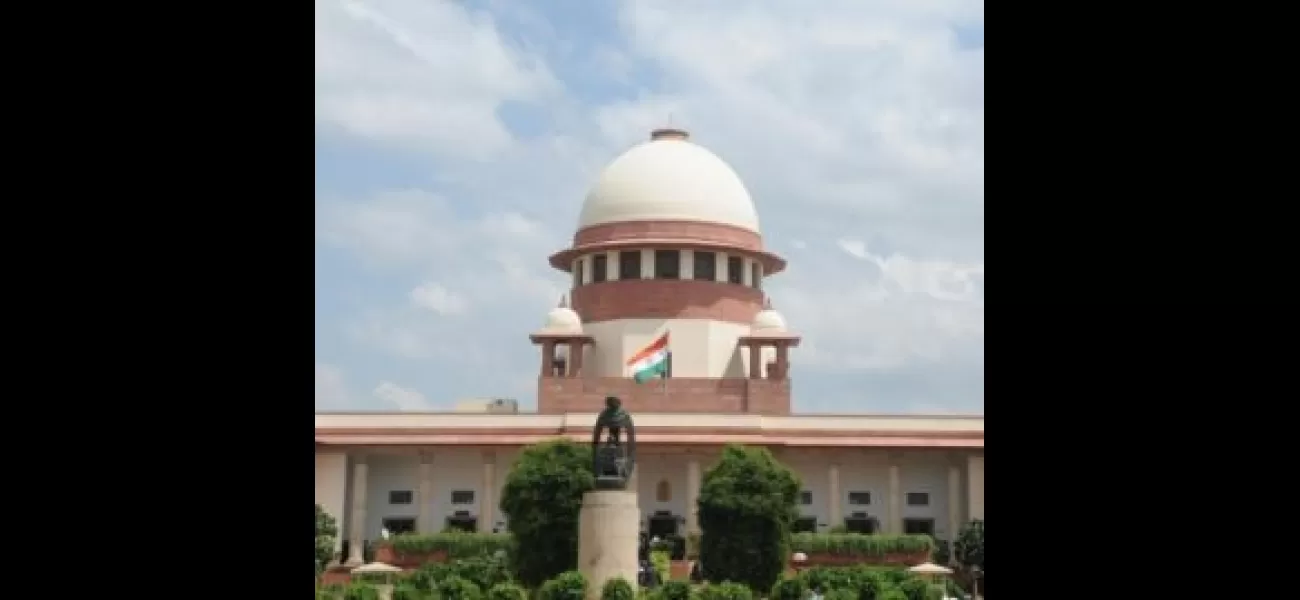The Supreme Court has suggested granting Kejriwal interim bail due to upcoming elections, according to ED.
India's Supreme Court may grant Delhi Chief Minister Arvind Kejriwal interim bail due to ongoing elections, offering hope to the AAP leader arrested in a money laundering case.
May 3rd 2024.

In a recent development, the Supreme Court has expressed its willingness to consider granting interim bail to Delhi Chief Minister Arvind Kejriwal. This comes as a ray of hope for the Aam Aadmi Party leader, who has been arrested in connection with a money laundering case linked to the excise policy.
Currently, Kejriwal is in judicial custody at Tihar jail, after being arrested on March 21. The bench of justices Sanjiv Khanna and Dipankar Datta has told the Enforcement Directorate that the arguments regarding Kejriwal's plea against his arrest may take some time. Therefore, the court is considering hearing the probe agency's stance on granting interim bail to Kejriwal, keeping in view the ongoing Lok Sabha elections in Delhi, which are scheduled for May 25.
In this regard, the court has asked Additional Solicitor General SV Raju, representing the ED, to be prepared with the case by May 7. The bench has also made it clear that the agency should not be taken by surprise on that day, as the issue of interim bail will be addressed. The court has clarified that it is not making any judgement on granting interim bail at this stage and will hear both sides before making a decision.
The ASG has opposed granting bail to Kejriwal, citing the statements made by AAP leader Sanjay Singh after being granted bail in the same case last month. The bench has also asked the senior advocate representing Kejriwal, Abhishek Singhvi, to take instructions on whether the CM should continue signing official files while being in custody.
Singhvi informed the court that the elections in Delhi were announced on March 16, and Kejriwal was arrested on March 21, based on statements and materials that were in the possession of the ED since last July. When asked about the polling date in Delhi, Singhvi replied that campaigning will end on May 23, and polling is scheduled for May 25.
The court has also questioned Singhvi's argument that AAP, being a political party, should not be covered under section 70 of the Prevention of Money Laundering Act, which deals with offences by companies. The bench has stated that anything done by a political party cannot be attributed to its President or other members, as it would lead to vicarious liability. Singhvi argued that this provision only applies to companies, not political parties.
The bench has also asked the ED why only inculpatory statements were listed in the grounds of arrest, and not the nine exculpatory statements of witnesses. Raju replied that the investigating officer is only required to mention the relevant material that makes him believe that the accused has committed the offence, and not the irrelevant material. However, the bench has disagreed with this argument, stating that all the material should be presented before the court at the time of arrest, as per the law and the 2022 verdict in the Vijay Madanlal Choudhury case.
The court had earlier issued a notice to the ED and sought its response to Kejriwal's plea against his arrest. The High Court had upheld Kejriwal's arrest on April 9, stating that there was no illegality, and the ED was left with little option after the CM repeatedly skipped summonses and refused to join the investigations. The case pertains to alleged corruption and money laundering in the formulation and execution of the Delhi government's excise policy for 2021-22.
Currently, Kejriwal is in judicial custody at Tihar jail, after being arrested on March 21. The bench of justices Sanjiv Khanna and Dipankar Datta has told the Enforcement Directorate that the arguments regarding Kejriwal's plea against his arrest may take some time. Therefore, the court is considering hearing the probe agency's stance on granting interim bail to Kejriwal, keeping in view the ongoing Lok Sabha elections in Delhi, which are scheduled for May 25.
In this regard, the court has asked Additional Solicitor General SV Raju, representing the ED, to be prepared with the case by May 7. The bench has also made it clear that the agency should not be taken by surprise on that day, as the issue of interim bail will be addressed. The court has clarified that it is not making any judgement on granting interim bail at this stage and will hear both sides before making a decision.
The ASG has opposed granting bail to Kejriwal, citing the statements made by AAP leader Sanjay Singh after being granted bail in the same case last month. The bench has also asked the senior advocate representing Kejriwal, Abhishek Singhvi, to take instructions on whether the CM should continue signing official files while being in custody.
Singhvi informed the court that the elections in Delhi were announced on March 16, and Kejriwal was arrested on March 21, based on statements and materials that were in the possession of the ED since last July. When asked about the polling date in Delhi, Singhvi replied that campaigning will end on May 23, and polling is scheduled for May 25.
The court has also questioned Singhvi's argument that AAP, being a political party, should not be covered under section 70 of the Prevention of Money Laundering Act, which deals with offences by companies. The bench has stated that anything done by a political party cannot be attributed to its President or other members, as it would lead to vicarious liability. Singhvi argued that this provision only applies to companies, not political parties.
The bench has also asked the ED why only inculpatory statements were listed in the grounds of arrest, and not the nine exculpatory statements of witnesses. Raju replied that the investigating officer is only required to mention the relevant material that makes him believe that the accused has committed the offence, and not the irrelevant material. However, the bench has disagreed with this argument, stating that all the material should be presented before the court at the time of arrest, as per the law and the 2022 verdict in the Vijay Madanlal Choudhury case.
The court had earlier issued a notice to the ED and sought its response to Kejriwal's plea against his arrest. The High Court had upheld Kejriwal's arrest on April 9, stating that there was no illegality, and the ED was left with little option after the CM repeatedly skipped summonses and refused to join the investigations. The case pertains to alleged corruption and money laundering in the formulation and execution of the Delhi government's excise policy for 2021-22.
[This article has been trending online recently and has been generated with AI. Your feed is customized.]
[Generative AI is experimental.]
0
0
Submit Comment





